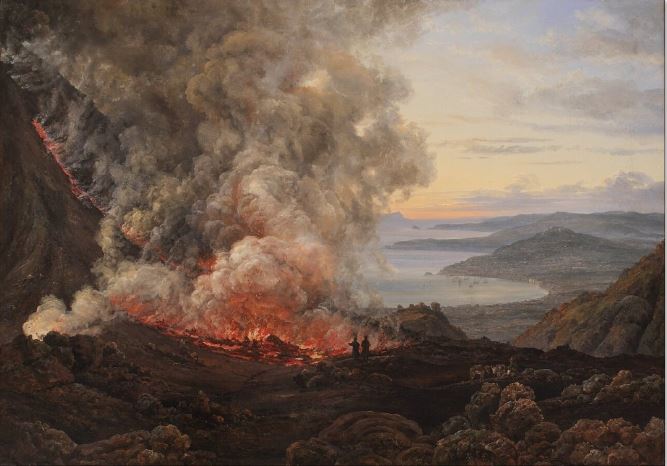ON THE MORNING of August 24th 79ad, the top of Mount Vesuvius in southern Italy split apart with a thunderous explosion. Smoke mushroomed into the sky darkening the sun. A rain of volcanic cinders and ash began to sift down amid terrific crashes and terrifying flashes of light.
Violence descended on the two nearby cities of Herculaneum and Pompeii. Herculaneum was engulfed by an avalanche of volcanic mud. In Pompeii the terror came by ash and cinders, coupled with clouds of suffocating sulphur fumes. Destruction of all life was sudden and complete.
The cities remained buried under volcanic rubble for almost 17 centuries, until they were uncovered by archaeologists and the picture of their terrible end was realised.

The ruins of Pompeii were quite different from the ruins of a city which has withered away or even been buried in mud. When the city died its inhabitants were about their everyday business. The baker in his cookhouse, mourners at the last rites of the deceased, whole families gathered in their homes, all died together.
Cause for Reflection
It’s frightening to read of the fate of these people. Destruction came suddenly, and life’s book was closed for them all. Wealth was valueless—slave and noble perished together. When we think about this there are lessons to be learnt. One reaction might be “Let us eat and drink, for tomorrow we die!” (Isaiah 22:13); but surely there’s more to life. What of the time beyond tomorrow? The Bible speaks of life after death, and surely this is something to investigate.
Shortly before he died, Jesus had words of warning for his disciples:
But take heed to yourselves, lest your hearts be weighed down with carousing, drunkenness, and cares of this life, and that day come on you unexpectedly. For it will come as a snare on all those who dwell on the face of the whole earth. Watch therefore, and pray always that you may be counted worthy to escape all these things that will come to pass, and to stand before the Son of Man (Luke 21:34–36).
He was speaking of his return from heaven to establish his kingdom. Would they be ready for it? Will you and I be ready for it? Your direction depends upon important factors of mind and intent.
There were religious leaders in Jesus’ day called scribes and Pharisees. Most people viewed them as good and upright, but Jesus called them “whitewashed tombs” which looked clean and smart outside but inside were full of dead men’s bones (Matthew 23:27). God looks beyond our outward appearance and sees what is in our heart. “There is no creature hidden from His sight, but all things are naked and open to the eyes of Him to whom we must give account” (Hebrews 4:13). And to Him the objective of our lives is important. He has told us so.
Thus says the Lord: “Let not the wise man glory in his wisdom, let not the mighty man glory in his might, nor let the rich man glory in his riches; but let him who glories glory in this, that he understands and knows Me, that I am the Lord, exercising lovingkindness, judgment, and righteousness in the earth. For in these I delight,” says the Lord (Jeremiah 9:23–24).
The objective of our lives is to develop a character like God’s, so that He may use us in His future service.
Power for Life
The dynamic force behind the Christian life is the Word of God. It will transform our thinking and shed light on our path. The natural world—so to speak—is in darkness. We must come into the light, a process which demands the repudiation of the old life and acceptance of God’s way. The Apostle Paul said to his fellow believers: “For it is the God who commanded light to shine out of darkness, who has shone in our hearts to give the light of the knowledge of the glory of God in the face of Jesus Christ”
(2 Corinthians 4:6).
The shining of this light in our hearts gives rise to pure thinking as well as outward goodness—unlike the scribes and Pharisees.
Christ will come back to the earth with the same kind of suddenness that brought swift destruction to the inhabitants of Pompeii. At his coming, our life will be complete—as it is at that moment.
Where Are You Going?
In John Bunyan’s allegorical story The Pilgrim’s Progress, Christian and Hopeful are walking towards Mount Zion when, to their surprise, they see another person coming towards them from that direction. His name is Atheist and he asks them where they are going. Christian answers, “We are going to the Mount Zion.” Atheist laughs and tells them they are wasting their time, because “There is no such place as you dream of in all this world.” He says he has been looking and has not found it.
We all meet sceptics like this. They claim to be ‘searching’ but are going nowhere. It’s far better to seek to have true simple faith in God and His Son, as expressed by Jesus:
Ask, and it will be given to you; seek, and you will find; knock, and it will be opened to you (Matthew 7:8).
Ken Quixley

